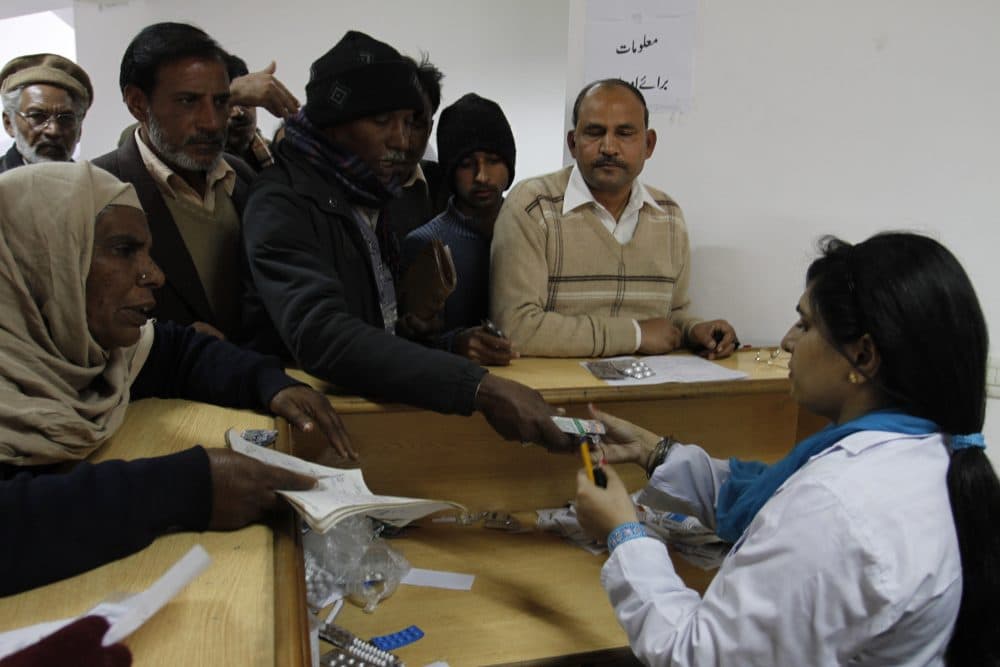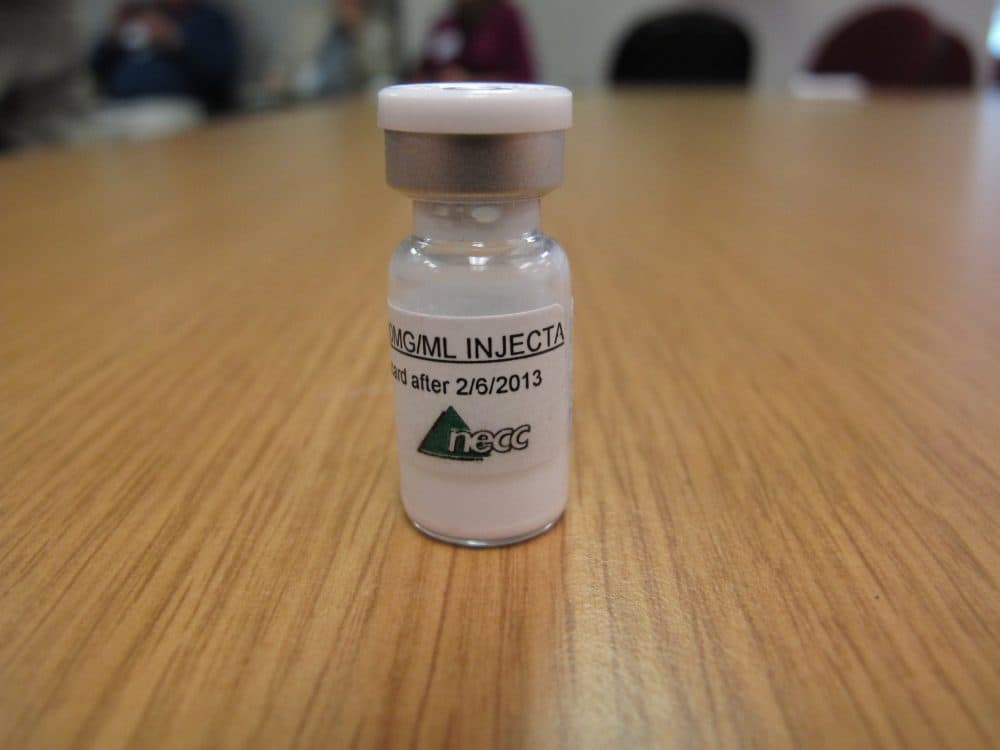Advertisement
Why Counterfeit Drugs Are A Global Problem With No Foolproof Solutions

In one terrible month spanning late 2011 and early 2012, more than 650 heart disease patients turned up in hospitals around Lahore, Pakistan, with darkening skin, vomiting and uncontrolled bleeding. Over 150 died. It turned out the medicine they were given to reduce their high blood pressure was contaminated with an anti-malarial drug.
The tragedy hit home with Muhammad Zaman, a Howard Hughes Medical Institute professor of biomedical engineering and international health at Boston University, who has friends and family in Lahore.
Zaman began investigating the problem of substandard and fake drugs in his native Pakistan. But he quickly realized it was a problem of global proportions. That same year, more than 800 Americans were sickened and 76 killed in a meningitis outbreak caused by the New England Compounding Center in Framingham.
Zaman recently published a book on the subject, "Bitter Pills: The Global War on Counterfeit Drugs." He spoke with me about the scope of the problem and some possible solutions. This interview has been edited and condensed.
Is the problem of faulty or counterfeit medications truly global?
This is neither limited to a given country nor a new problem. We have plenty of data to know that in the 17th century, when Cinchona bark from Peru became a blockbuster drug [to treat malaria], it was equally problematic to get good quality of that as it is now to get good-quality anti-malarials in many parts of the world.
Aside from the terrible but rare disasters, why should we worry about drug counterfeiting and fakery?
I worry that widespread use of poor-quality medicines will increase antibiotic resistance. That is no longer only a problem of Pakistan. It’s also a problem of Portland and Portsmouth and Boston. With the internet, it is not a foregone conclusion that these [drugs] will not enter the U.S. market as well, under the radar. Unless we stem the tides of these things globally, they’ll affect everyone.
Is it inevitable that some people will exploit people's ill health?
Some people will have an inherent desire to make money even when it compromises someone else’s well-being. Also, a lot of it is lack of judicial oversight and lack of following the highest standards -- cutting corners — because it is hard and expensive to make quality drugs. For others, it’s complete sloppiness and lack of understanding that this is a problem. Finally, it’s a question of priorities. This makes it a really deadly cocktail; there is no one single solution, because there is no one single origin of the problem.

What are the main issues in wealthy countries?
In the developed world, the problem is due more to counterfeiting, patent infringement and cheating. The regulatory system in the U.S. and high-income countries does work better than in low-income countries. On the other hand, a lot more drugs are now procured over the internet in the developed world [so it's hard to know where they're coming from].
You say that in Pakistan, drugstores range in quality, like restaurants. Do we, living in Boston, need to worry about the drugstore down the street?
Most of the time no, but every now and then there is a danger. If it does happen, we have mechanisms to get to the bottom of it much more quickly than, let’s say, somebody in Uganda would.
What are pharmaceutical companies doing about this problem?
Large pharmaceutical companies are very worried [about counterfeiting]. For them, this is an issue of trust. If you were to take a Lipitor [a cholesterol drug] that didn’t work, you wouldn’t assume it was [counterfeit], you’d start to think Pfizer isn’t making good-quality products. Pfizer spends probably more than any other company trying to track down counterfeit Viagra.
So who are the victims here?
Everybody considers themselves a victim. The large pharmaceutical companies say, “These small generics copy our research that we’ve spent billions of dollars on, and they’ve never done anything. They are pirates.” [Companies that make] low-cost generics argue that they make it possible for the poorest of the poor to have quality drugs at affordable prices -- they would point to HIV in Africa. Consumers also feel like victims. Everybody feels they’ve been wronged.
What are pharmacists doing about this?
In general, awareness is so bad that in many countries pharmacists who are at the front lines have never heard of the challenges of poor-quality medicine. They’ve never seen that in their curriculum, they’ve never learned how to tackle it. Because their solutions are so fragmented, they are unable to work together, and sometimes that makes the problem worse. For example, in Pakistan, there are some pharmacies that are better than others. Somebody who is unaware, doesn’t have the necessary street smartness, will go to a pharmacy that may not be very good.
As an engineer, you’ve helped develop a tool to improve the testing of drug quality. Do you see technology as the solution to the problem of poor quality medications?
Technology is part of the solution, it’s essential. But at the end of the day, if you don’t have a justice system to implement the findings of the technology, it’s not going to be very good.
And aid agencies?
Historically, aid agencies have worked in silos and have focused largely on individual diseases. There may be funding in Senegal for testing malaria drugs, so their quality might be good, but the quality of their [tuberculosis] drugs might not be, and they can’t use the money to sample TB or HIV drugs.
So clearly, there won’t be a single answer. But where do you think we should look for inspiration and ideas?
I would point to two examples, one top-down the other bottom-up.
In the aviation industry, we have agreed through treaties and general understanding that when it comes to a plane, we want parts to come from the right manufacturers that have a certain level of quality control. That’s a top-down solution.
For the bottom-up solution, I would give the example of ivory. In the U.S., but also across the world, we have now agreed that the ivory trade should no longer be accepted. China ended all their legal ivory trade as of Dec. 31, 2017 -- not because of some kind of economic reason, but largely because of its image and political pressure. We need to create citizens who demand quality [medications], just as we have demanded that nobody trade in ivory.
